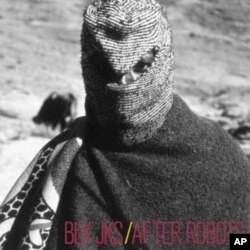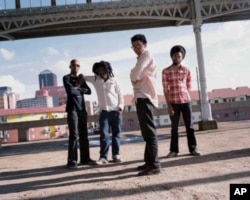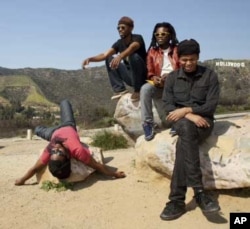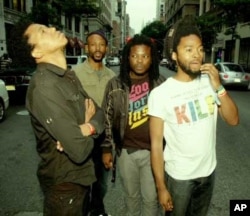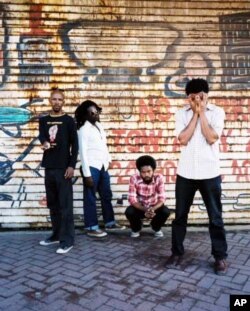This is Part 3 of a 5-part series: New Sounds of Africa
Continue to Parts: 1 / 2 / 3 / 4 / 5
It’s been two years since influential American magazine Rolling Stone declared that South Africa’s BLK JKS (pronounced ‘Black Jacks’) were “Africa’s best new band.”
To say that their debut album, After Robots, stunned the world of rock music would be an understatement. Here was a group of young black men from Soweto ripping to joyful shreds a status quo that maintained that alternative, psychedelic rock was largely the preserve of disaffected white American and British musicians.
But rhythm guitarist Mpumi Mcata insisted, “We really don’t set out to break down borders because (for us) there are no borders. There’s no limitation. We basically play what we can play.”
Yet, in the words of more than one music scribe, BLK JKS are the first band to “Africanize” indie – or independent – rock with their “slash-and-burn,” genre-bending assault on the international music scene.
Over the past few years, combining vocal duties, lead guitarist Lindani Buthelezi, Mcata, bassist Molefi Makananise and drummer Tshepang Ramoba have shared their sweeping, reverb-drenched maelstrom of sound with millions of people around the world.
Breaking chains
Wherever they play their music, Mcata agreed, BLK JKS can’t escape the “tag” of being black – and especially black South Africans – producing traditionally white music. “People are always asking how it happened that we make the music we make instead of something like kwaito,” he said. “And given the past, given existing prejudices and preconceptions, it’s not an unfair question to ask.”
But the issue clearly irritates Mcata. “It’s like people asking, ’Oh, you’re from China, why are you into reggae?’” he said, explaining, “There’s nothing really progressive about people in China who love reggae. It’s just that society puts so many chains on them that when they break those chains, it’s almost as if you’re supposed to give them an award, you know.”
The guitarist maintained that BLK JKS – like Chinese people who listen to reggae – “haven’t done anything amazing.”
But the critics and their legions of fans around the globe disagree.
Music like ‘Frankenstein’s monster’
Experts on modern rock music say with their alloy of hard and soft rock, jazz, blues and even heavy metal, BLK JKS sound can’t be defined. “Our music is all genres at all times, although we don’t set out willfully to create it like this; it just naturally turns out this way,” said Mcata. “Looseness and freedom is why we work. We just walk into a rehearsal room and we play and it becomes what it becomes.”
Mcata often talks in terms like these, of BLK JKS music having a life of its own, independent of its creators. “Like Frankenstein’s monster?” VOA asked him. “Yes, exactly like that,” Mcata answered, laughing.
He said BLK JKS music defies genres “by default, by virtue of the fact that we could never be a classic rock band, we wouldn’t know how to be that.” The main reason for this, Mcata explained, is that no one in the group is an “expert” instrumentalist.
“You could listen to us rehearse and you could listen to us make demos and you would think, ‘Man, these guys are a (expletive) band,’” he said. “The key to sorting our music out is throwing us into a studio. That’s where we function as a unit.”
Classic rock sound
But, as much as Mcata denies suggestions that BLK JKS are extraordinary, the foundations that make the “unit” clearly are. For a group that’s risen out of a South African township to reference such influences as legendary American rock guitarist Jimi Hendrix and British rock super-group Led Zeppelinis astounding.
Mcata said, “It’s almost like Jimi created a whole new instrument; the electric guitar was never the same again after him. So when people say BLK JKS music is like something they’ve never heard before, I really get off on that.”
With regard to Zeppelin, he added, the “dynamism and fluidity of (lead singer) Robert Plant and (guitarist) Jimmy Page is definitely something that BLK JKS aspires to. The partnership of Plant and Page is like, monstrous.”
Mcata credits his microbiologist father with introducing him to classic 1960s and 1970s rock. “He traveled the world; he brought back all these vinyl (records). He was into (American rock group) Santana. My Led Zeppelin thing was something that happened because of his love for Santana.”
‘No riffs’ discordance
Then, when Mcata was a teenager in the early 1990s, he’d spend hours watching music videos on TV. In so doing, he came across an important influence on BLK JKS music – Sonic Youth, an alternative band from New York City.
“The first song I heard by Sonic Youth was a song called ‘JC.’ I thought it was hip hop. I thought (vocalist) Kim (Gordon) was a rapper, because Kim talks, she doesn’t sing. She could be from any ghetto anywhere,” Mcata explained.
For him, Sonic Youth’s sound was a reinforcement of what he still believes to be true today – “There’s no such thing as black music or white music. Anyone who still thinks like this is stuck in the past.”
Mcata said BLK JKS remain attracted to the “discordance” of Sonic Youth’s music. “That’s like a lot of our songs; they’re hard to grasp because they don’t have a lot of riffs. I suppose that’s also why our songs aren’t played on mainstream radio stations. There’s nothing you can really grab onto and say, ‘Wow, that’s a great tune; I can’t get that chorus out of my head.’”
No commercial hit singles
Yet it’s exactly BLK JKS eclectic nature and the dissonance and atypical structures of their songs that have won them global popularity. At the opening ceremony of the 2010 Soccer World Cup in South Africa, they shared a stage with American R&B superstar Alicia Keys http://www.youtube.com/watch?v=Urdlvw0SSEc , before a global TV audience of about one billion.
The band has received high praise from such esteemed music magazines as Uncut, Mojo and The Fader. BLK JKS continue to gig in world capitals such as London, New York and Paris. They appear regularly at rock music’s most high-profile festivals, such SXSW in Austin, Texas.
But, in spite of all this, very few African radio stations – including in their home country – play BLK JKS music.
Mcata said he and his group mates “aren’t bothered by this at all. We all knew that if we were going to be truly free and do what we wanted to do, we wouldn’t be making hit singles. Our audiences generally consist of headstrong individuals who don’t buy whatever’s advertised on the poster down at the music store but who dig in the crates at the back for the music that’s not being pumped out on mainstream commercial stations every hour of every day.”
‘Barrage of bottles’ in Soweto
For BLK JKS, fame in alternative rock circles internationally is now a reality. But the band will not abandon its Soweto roots. “We’ve played there a few times now, and many more people know us there now. Soweto’s a great testing ground for us,” said Mcata, before adding ominously, “If you’re crap in Soweto, you’ll know...”
If they think they aren’t being provided with quality entertainment, audiences in Soweto have no aversion to driving musicians from a stage with sustained waves of insults…and worse. Some acts that have refused to stop performing have had to make their escape under a barrage of bottles and other dangerous objects.
“That hasn’t happened (to BLK JKS) yet,” Mcata laughed. “People (in Soweto) love our stuff. We’ve played in the rain there and people stayed in the rain; there was like slipping and sliding on the grass, and we’ve played in the cold in Soweto and people stayed out there….”
But, with regard to Soweto, the race issue, again, has often been raised by music writers, who’ve stated that BLK JKS music doesn’t go down well there because it isn’t “black music.”
Mcata scoffed at this, saying, “I think a lot of the time the media patronizes audiences and think that (black) audiences won’t understand our ‘high brow’ music and make decisions ahead of time saying, ‘the audience didn’t like BLK JKS music because it’s white music.’”
He added, “We’ve played gigs with many big bands, and the shows were their shows. You’d think that the people who liked their music wouldn’t like the BLK JKS. But we put our music in front of them and gave them the power to decide, and we’ve mostly been very pleasantly surprised at the reactions.”
Every now and again the BLK JKS further enhance their reputation for doing the unexpected…. And they replace their trademark heavy discordance with light acoustic melodies – sung not in English for a world market, but with a South African tongue.
This element of surprise, said Mcata, keeps BLK JKS music fresh in the minds of their ever-growing mass of fans.





